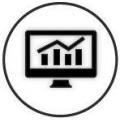Data are the foundations of the social and biological sciences. Familiarizing yourself with a programming language can help you better understand the roles that data play in your field. Learn to develop and train your data skills at the free D-Lab R workshops!
Sign up for our weekly newsletter!
This is an archive of our past training offerings. We are looking to include workshops on topics not yet covered here. Is there something not currently on the list? Send us a proposal.
An intro to the basics that instructors often assume you know, but that you probably never had good instruction on! After this course, you should be able to more easily start learning to program (e.g., in our R or Python Fundamentals series), follow instructions and documentation online (e.g., StackExchange), and communicate better with your collaborators who are programming.
This workshop will provide an overview of popular QDA software (i.e., NVivo, MaxQDA, Dedoose, and Atlas.TI), including a review of similarities and differences. This workshop is ideal for researchers who are new to QDA software. More advanced workshops will be offered throughout the semester.
This workshop focuses on how to organize and code qualitative data in MaxQDA. The training will outline key decisions researchers must make in the coding process, as well as review how to start a new MaxQDA project and engage in the following tasks: set up a database, use folders, add codes, add document variables, conduct queries, and explore data for further analysis.
This workshop focuses on how to organize and code qualitative data in Dedoose. The training will outline key decisions researchers must make in the coding process, as well as reviews how to start a new Dedoose project and engage in the following tasks: add codes, set up a code system, code data, add characteristics about data, run analysis tools, and explore data for further analysis.
Through this workshop, attendees will explore the process of moving from coded qualitative data to conclusions. Attendees will explore the logic of analysis, identification of relationships in data, and building of arguments with data.
The workshop will be an intensive two-day introduction to R using RStudio. Topics will include
This four-part, interactive workshop series is your complete introduction to programming Python for people with little or no previous programming experience. By the end of the series, you will be able to apply your knowledge of basic principles of programming and data manipulation to a real-world social science application.
Part 3: Unsupervised Approaches (12-2pm)
This hands on workshop builds on part 2 by introducing the basics of Python's scikit-learn package to implement unsupervised text analysis methods. This workshop will cover a) vectorization and Document Term Matrices, b) weighting (tf-idf), and c) uncovering patterns using topic modeling.
Data are the foundations of the social and biological sciences. Familiarizing yourself with a programming language can help you better understand the roles that data play in your field. Learn to develop and train your data skills at the free D-Lab R workshops!
This workshop will focus on how to create publication-ready graphs using Stata. We will begin with a short demo of how to create standard graphs in Stata, and continue on to more high-quality formats for greater legibility and a more polished display.
This culminating event will engage attendees in a review, reflection, and discussion about the topics covered in the week-long series of workshops offered under the title "Introduction to Qualitative Research: Philosophy to Analysis." This event is designed for those who plan to attend all (or most) workshops in the series (available for registration via D-Lab's website). Specific activities wi
This intermediate workshop expands on an introductory workshop offered on the same software. The training will review how to engage in more advanced tasks, and how to begin moving from coding to making conclusions with the data.
Part 1: Methods and Approaches (12-2pm)
This non-technical workshop provides an overview of computational text analysis methods and tools. No experience in this area is expected or required. The goal is to provide an orientation for those wishing to go further with text analysis and interpret results of these methods.
This three-part series will cover the following materials:
Part 1: Introduction (Tuesday, August 15)
This introductory workshop focuses on how to organize and code qualitative data in ATLAS.ti. The training will outline key decisions researchers must make in the coding process, as well as review how to start a new project and engage in basic tasks.
This workshop will provide an overview of popular qualitative data analysis (QDA) software (i.e., NVivo, MaxQDA, Dedoose, and Atlas.TI), including a review of similarities and differences between them. This workshop is ideal for researchers who are new to QDA software. More advanced workshops will be offered in the days after this introduction, as well as throughout the semester.
This four-part, interactive workshop series is your complete introduction to programming Python for people with little or no previous programming experience. By the end of the series, you will be able to apply your knowledge of basic principles of programming and data manipulation to a real-world social science application.
Part 3 Topics:
Data are the foundations of the social and biological sciences. Familiarizing yourself with a programming language can help you better understand the roles that data play in your field. Learn to develop and train your data skills at the free D-Lab R workshops!





